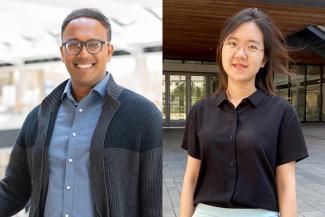
Texas ECE assistant professors Shwetadwip Chowdhury and Hyeji Kim have been selected to receive a Faculty Early Career Development (CAREER) Award from the National Science Foundation (NSF). The award is the most prestigious offered by NSF’s CAREER Program, providing up to five years of funding to junior faculty members who exemplify the role of teacher-scholars through outstanding research, excellent education and the integration of education and research within the context of their organizations’ missions.
Chowdhury received the award for work on "Deep-tissue optical imaging via inverse-scattering." The project will specifically focus on developing imaging pipelines to achieve computational scatter-correction in real-world biological samples.
Kim received the award for work on "Advancing Distributed Data Compression and Communication via Generative Models, Learning, and Information Theory." The overarching goal of the project is to establish frameworks that integrate information theory and learning to develop new compression and communication algorithms.
Shwetadwip Chowdhury is an Assistant Professor and Fellow of the Jack Kilby/Texas Instruments Endowed Faculty Fellowship in Computer Engineering in the Department of Electrical and Computer Engineering at the University of Texas at Austin. His research interests are in developing next generation optical imaging technologies for applications in science and medicine. A key emphasis in his work is the joint design of novel optical imaging systems and advanced computational frameworks. This co-design of hardware and software enables imaging capabilities not possible in traditional optical imaging systems
Hyeji Kim is an Assistant Professor in the Department of Electrical and Computer Engineering and a Fellow of the Advanced Micro Devices (AMD) Chair in Computer Engineering at The University of Texas at Austin. Her research interests lie at the intersection of information theory and machine learning. In applying information theory to machine learning, her current focus includes the information theoretic analysis and development of machine learning algorithms. In applying machine learning to information theory, her current focus includes the development of codes for communication and compression via machine learning
